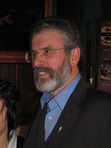I am proud to be a rebel - Roger Casement
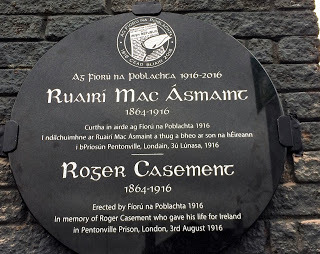
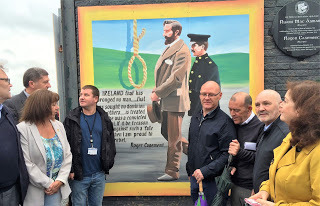 A Plaque and Mural to Roger Casement were unveiled at Casement Park on Wednesday morning the centenary of his execution.
A Plaque and Mural to Roger Casement were unveiled at Casement Park on Wednesday morning the centenary of his execution.
Tuesday was the anniversary of Big Doc’s (Kieran Doherty) death on hunger strike. He died the day after Kevin Lynch. Five days earlier on July 29th 1981 I had visited the H Block Hospital in Long Kesh with Owen Carron and Seamus Ruddy of the IRSP. By this point in the hunger strike Bobby, Francie, Raymond, Patsy, Martin and Joe had all died. As well as Big Doc and Kevin, Tom McElwee, Laurence McKeown, Matt Devlin, Pat McGeown, Paddy Quinn and Mickey Devine were in the prison hospital. I met all of them together except Kevin and Bid Doc. Kevin was too ill. When I entered Doc’s room he was propped up on one elbow listening. He was on his 69th day of hunger strike and could no longer see. But Doc was as determined as ever. He understood the gravity of the situation. His words were defiant: “Too much suffered for too long, too many good men dead. Thatcher can’t break us. Lean ar aghaidh. I’m not a criminal… I don't want to die, but that's up to the Brits. They think they can break us. Well they can’t…Tiocfaidh ár lá." Five days later Big Doc died.Sadly, Irish history is replete with the stories of men and women, of heroes who died in pursuit of freedom. Another of these is Roger Casement whose centenary anniversary is this week. He was hanged by the British on August 3rd1916. He was the last of the leaders of the Rising to be executed.Casement was born in Dublin but was raised in and around Ballymena in County Antrim. He was a member of an Ulster Protestant family, a Knight of the British Empire and a British diplomat. He was also a gaelgóir who loved the Glens of Antrim. He was proud to be Irish and was resolutely opposed to British rule in Ireland. During his time as a British diplomat Roger Casement saw at first hand the impact of European Imperialism in Africa and South America. He wrote extensively about this and his efforts succeeded in bring some positive change to the lives of millions of people.In 1903 Casement was asked by the British government to produce a report on the conditions in what was then called the Belgian Congo. Casement was thorough in his endeavours and his report gives an insight into how European colonialism acted in its own self-interest and the horrifying effect this had on the local peoples. And like Ireland, where the initial excuse for the English invasion was to ‘civilise the barbarians’, so too was this pretext used in Africa.The Belgian King Leopold 11 had established in 1876 an ‘international benevolent committee for the propagation of civilization among the peoples of Central Africa.’ 8 years later at the Conference of Berlin the European colonial powers, along with the Ottoman Empire and the United States, divided Africa up among themselves.Leopold established the Congo Free State, a territory of over two million square miles and it became his personal fiefdom, his sole property. He set up the Force Publique and military body run by white officers whose job it was to ensure that the Congo’s vast wealth and resources were exploited in Leopold’s interests. Rubber and ivory were the main produces. Indigenous workers were mercilessly exploited. Many died from exhaustion and hunger and disease working on the rubber plantations. Resistance was ruthlessly suppressed. Victims were often flogged using the chicotte, a whip made of sun-dried hippopotamus hide with razor-sharp edges. Most victims were given a hundred lashes from which many died. Those who tried to escape or rebel had their right hand cut off.This was the state of the Congo when Casement was asked to journey there and produce a report. Casement’s exposé of the cruelty of Leopold’s activities created an international outcry. Leopold was stripped of his control of the Congo by the Belgian government.
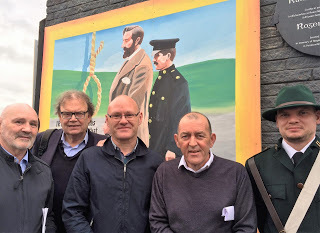 Casement was subsequently sent to South America by the British government. He was appointed Consul-General in Rio de Janeiro in Brazil and was asked to investigate the use of slaves and the ill-treatment of local native people by a British rubber company. In his report to the British Foreign Secretary on St. Patrick’s Day 1911 he graphically described the atrocities being carried out by the rubber company. It was this record of work as a diplomat and a senior public servant for the British Empire which almost certainly sealed his fate in August 1916. More than any of the other leaders of the Rising Casement was seen by the British establishment as a traitor to his class and to the Empire.In 1913 Casement helped found the Irish Volunteers. He travelled to the USA to raise money for that organisation and was involved in the smuggling of German weapons into Howth in July 1914. Casement negotiated with the German government during the First World War for more guns and assistance for the planned rebellion. In April 1916, Casement returned to Ireland on board a German submarine. He was captured at an old ringfort near Banna Strand in County Kerry just three days before the Rising. He was sent to London where he was tried for treason. The inevitable verdict was guilty and despite many pleas for clemency, he was sentenced to death. Roger Casement was hanged on August 3rd1916.Casement’s speech from the Dock, like the last words of those executed in May 1916, still resonate 100 years later for a new generation of Irish republicans. It is a scathing critique of Britain’s presence in Ireland and of the right of the Irish nation to freedom. It’s much too long to carry here but the following excerpts give some sense of its strength and vitality and durability. “With all respect, I assert this court is to me, an Irishman, charged with this offence, a foreign court -- this jury is for me, an Irishman, not a jury of my peers to try me on this vital issue, for it is patent to every man of conscience that I have a right, an indefeasible right, if tried at all, under this statute of high treason, to be tried in Ireland, before an Irish court and by an Irish jury. This court, this jury, the public opinion of this country, England, cannot but be prejudiced in varying degrees against me, most of all in time of war. I did not land in England. I landed in Ireland. It was to Ireland I came; to Ireland I wanted to come; and the last place I desired to land was in England…This is the condemnation of English rule, of English-made law, of English government in Ireland, that it dare not rest on the will of the Irish people, but exists in defiance of their will: that it is a rule, derived not from right, but from conquest... I am proud to be a rebel and shall cling to my ‘rebellion’ with the last drop of my blood.”
Casement was subsequently sent to South America by the British government. He was appointed Consul-General in Rio de Janeiro in Brazil and was asked to investigate the use of slaves and the ill-treatment of local native people by a British rubber company. In his report to the British Foreign Secretary on St. Patrick’s Day 1911 he graphically described the atrocities being carried out by the rubber company. It was this record of work as a diplomat and a senior public servant for the British Empire which almost certainly sealed his fate in August 1916. More than any of the other leaders of the Rising Casement was seen by the British establishment as a traitor to his class and to the Empire.In 1913 Casement helped found the Irish Volunteers. He travelled to the USA to raise money for that organisation and was involved in the smuggling of German weapons into Howth in July 1914. Casement negotiated with the German government during the First World War for more guns and assistance for the planned rebellion. In April 1916, Casement returned to Ireland on board a German submarine. He was captured at an old ringfort near Banna Strand in County Kerry just three days before the Rising. He was sent to London where he was tried for treason. The inevitable verdict was guilty and despite many pleas for clemency, he was sentenced to death. Roger Casement was hanged on August 3rd1916.Casement’s speech from the Dock, like the last words of those executed in May 1916, still resonate 100 years later for a new generation of Irish republicans. It is a scathing critique of Britain’s presence in Ireland and of the right of the Irish nation to freedom. It’s much too long to carry here but the following excerpts give some sense of its strength and vitality and durability. “With all respect, I assert this court is to me, an Irishman, charged with this offence, a foreign court -- this jury is for me, an Irishman, not a jury of my peers to try me on this vital issue, for it is patent to every man of conscience that I have a right, an indefeasible right, if tried at all, under this statute of high treason, to be tried in Ireland, before an Irish court and by an Irish jury. This court, this jury, the public opinion of this country, England, cannot but be prejudiced in varying degrees against me, most of all in time of war. I did not land in England. I landed in Ireland. It was to Ireland I came; to Ireland I wanted to come; and the last place I desired to land was in England…This is the condemnation of English rule, of English-made law, of English government in Ireland, that it dare not rest on the will of the Irish people, but exists in defiance of their will: that it is a rule, derived not from right, but from conquest... I am proud to be a rebel and shall cling to my ‘rebellion’ with the last drop of my blood.”
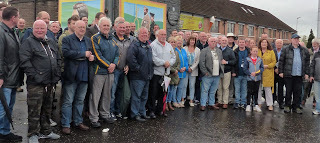
Published on August 04, 2016 06:45
No comments have been added yet.
Gerry Adams's Blog
- Gerry Adams's profile
- 29 followers
Gerry Adams isn't a Goodreads Author
(yet),
but they
do have a blog,
so here are some recent posts imported from
their feed.


